Below is the extra info needed for the lab In this assignmen
Solution
class TestMain{
public static void main(String args[]){
IntArrayBag b1=new IntArrayBag();
IntArrayBag b2=new IntArrayBag();
b1.add(4);b1.add(4);b1.add(7);b1.add(7);b1.add(7);b1.add(8);b1.add(1);
b2.add(4);b2.add(7);b2.add(6);b2.add(1);
System.out.println(\"B1:\"+b1.toString());
System.out.println(\"B2:\"+b2.toString());
IntArrayBag b3=IntArrayBag.intersection(b1,b2);
System.out.println(\"B3:\"+b3.toString());
IntArrayBag b4=IntArrayBag.intersection(b1,b2);
System.out.println(\"B4:\"+b4.toString());
System.out.println(\"B4==B3:\"+b3.equals(b4));
System.out.println(\"B1==B2:\"+b1.equals(b2));
}
}
class IntArrayBag implements Cloneable
{
// Invariant of the IntArrayBag class:
// 1. The number of elements in the bag is in the instance variable
// manyItems, which is no more than data.length.
// 2. For an empty bag, we do not care what is stored in any of data;
// for a non-empty bag, the elements in the bag are stored in data[0]
// through data[manyItems-1], and we don’t care what’s in the
// rest of data.
private int[ ] data;
private int manyItems;
/**
* Initialize an empty bag with an initial capacity of 10. Note that the
* addItem method works efficiently (without needing more
* memory) until this capacity is reached.
* @postcondition
* This bag is empty and has an initial capacity of 10.
* @exception OutOfMemoryError
* Indicates insufficient memory for:
* new int[10].
**/
public IntArrayBag( )
{
final int INITIAL_CAPACITY = 10;
manyItems = 0;
data = new int[INITIAL_CAPACITY];
}
/**
* Initialize an empty bag with a specified initial capacity. Note that the
* addItem method works efficiently (without needing more
* memory) until this capacity is reached.
* @param initialCapacity
* the initial capacity of this bag
* @precondition
* initialCapacity is non-negative.
* @postcondition
* This bag is empty and has the given initial capacity.
* @exception IllegalArgumentException
* Indicates that initialCapacity is negative.
* @exception OutOfMemoryError
* Indicates insufficient memory for: new int[initialCapacity].
**/
public IntArrayBag(int initialCapacity)
{
if (initialCapacity < 0)
throw new IllegalArgumentException
(\"The initialCapacity is negative: \" + initialCapacity);
data = new int[initialCapacity];
manyItems = 0;
}
/**
* Add a new element to this bag. If the new element would take this
* bag beyond its current capacity, then the capacity is increased
* before adding the new element.
* @param element
* the new element that is being inserted
* @postcondition
* A new copy of the element has been added to this bag.
* @exception OutOfMemoryError
* Indicates insufficient memory for increasing the bag\'s capacity.
* @note
* An attempt to increase the capacity beyond
* Integer.MAX_VALUE will cause the bag to fail with an
* arithmetic overflow.
**/
public void add(int element)
{
if (manyItems == data.length)
{ // Ensure twice as much space as we need.
ensureCapacity((manyItems + 1)*2);
}
data[manyItems] = element;
manyItems++;
}
/**
* Add new elements to this bag. If the new elements would take this
* bag beyond its current capacity, then the capacity is increased
* before adding the new elements.
* @param elements
* (a variable-arity argument)
* one or more new elements that are being inserted
* @postcondition
* A new copy of the element has been added to this bag.
* @exception OutOfMemoryError
* Indicates insufficient memory for increasing the bag\'s capacity.
* @note
* An attempt to increase the capacity beyond
* Integer.MAX_VALUE will cause the bag to fail with an
* arithmetic overflow.
**/
public void addMany(int... elements)
{
if (manyItems + elements.length > data.length)
{ // Ensure twice as much space as we need.
ensureCapacity((manyItems + elements.length)*2);
}
System.arraycopy(elements, 0, data, manyItems, elements.length);
manyItems += elements.length;
}
/**
* Add the contents of another bag to this bag.
* @param addend
* a bag whose contents will be added to this bag
* @precondition
* The parameter, addend, is not null.
* @postcondition
* The elements from addend have been added to this bag.
* @exception NullPointerException
* Indicates that addend is null.
* @exception OutOfMemoryError
* Indicates insufficient memory to increase the size of the bag.
* @note
* An attempt to increase the capacity beyond
* Integer.MAX_VALUE will cause an arithmetic overflow
* that will cause the bag to fail. Such large collections should use
* a different bag implementation.
**/
public void addAll(IntArrayBag addend)
{
// If addend is null, then a NullPointerException is thrown.
// In the case that the total number of items is beyond
// Integer.MAX_VALUE, there will be an arithmetic overflow and
// the bag will fail.
ensureCapacity(manyItems + addend.manyItems);
System.arraycopy(addend.data, 0, data, manyItems, addend.manyItems);
manyItems += addend.manyItems;
}
/**
* Generate a copy of this bag.
* @return
* The return value is a copy of this bag. Subsequent changes to the
* copy will not affect the original, nor vice versa.
* @exception OutOfMemoryError
* Indicates insufficient memory for creating the clone.
**/
public IntArrayBag clone( )
{ // Clone an IntArrayBag object.
IntArrayBag answer;
try
{
answer = (IntArrayBag) super.clone( );
}
catch (CloneNotSupportedException e)
{ // This exception should not occur. But if it does, it would probably
// indicate a programming error that made super.clone unavailable.
// The most common error would be forgetting the \"Implements Cloneable\"
// clause at the start of this class.
throw new RuntimeException
(\"This class does not implement Cloneable\");
}
answer.data = data.clone( );
return answer;
}
/**
* Accessor method to count the number of occurrences of a particular element
* in this bag.
* @param target
* the element that needs to be counted
* @return
* the number of times that target occurs in this bag
**/
public int countOccurrences(int target)
{
int answer;
int index;
answer = 0;
for (index = 0; index < manyItems; index++)
if (target == data[index])
answer++;
return answer;
}
/**
* Change the current capacity of this bag.
* @param minimumCapacity
* the new capacity for this bag
* @postcondition
* This bag\'s capacity has been changed to at least minimumCapacity.
* If the capacity was already at or greater than minimumCapacity,
* then the capacity is left unchanged.
* @exception OutOfMemoryError
* Indicates insufficient memory for: new int[minimumCapacity].
**/
public void ensureCapacity(int minimumCapacity)
{
int[ ] biggerArray;
if (data.length < minimumCapacity)
{
biggerArray = new int[minimumCapacity];
System.arraycopy(data, 0, biggerArray, 0, manyItems);
data = biggerArray;
}
}
/**
* Accessor method to get the current capacity of this bag.
* The add method works efficiently (without needing
* more memory) until this capacity is reached.
* @return
* the current capacity of this bag
**/
public int getCapacity( )
{
return data.length;
}
/**
* Remove one copy of a specified element from this bag.
* @param target
* the element to remove from the bag
* @return
* If target was found in the bag, then one copy of
* target has been removed and the method returns true.
* Otherwise the bag remains unchanged and the method returns false.
**/
public boolean remove(int target)
{
int index; // The location of target in the data array.
// First, set index to the location of target in the data array,
// which could be as small as 0 or as large as manyItems-1; If target
// is not in the array, then index will be set equal to manyItems;
for (index = 0; (index < manyItems) && (target != data[index]); index++)
// No work is needed in the body of this for-loop.
;
if (index == manyItems)
// The target was not found, so nothing is removed.
return false;
else
{ // The target was found at data[index].
// So reduce manyItems by 1 and copy the last element onto data[index].
manyItems--;
data[index] = data[manyItems];
return true;
}
}
/**
* Determine the number of elements in this bag.
* @return
* the number of elements in this bag
**/
public int size( )
{
return manyItems;
}
/**
* Reduce the current capacity of this bag to its actual size (i.e., the
* number of elements it contains).
* @postcondition
* This bag\'s capacity has been changed to its current size.
* @exception OutOfMemoryError
* Indicates insufficient memory for altering the capacity.
**/
public void trimToSize( )
{
int[ ] trimmedArray;
if (data.length != manyItems)
{
trimmedArray = new int[manyItems];
System.arraycopy(data, 0, trimmedArray, 0, manyItems);
data = trimmedArray;
}
}
/**
* Create a new bag that contains all the elements from two other bags.
* @param b1
* the first of two bags
* @param b2
* the second of two bags
* @precondition
* Neither b1 nor b2 is null, and
* b1.getCapacity( ) + b2.getCapacity( ) <= Integer.MAX_VALUE.
* @return
* the union of b1 and b2
* @exception NullPointerException
* Indicates that one of the arguments is null.
* @exception OutOfMemoryError
* Indicates insufficient memory for the new bag.
* @note
* An attempt to create a bag with a capacity beyond
* Integer.MAX_VALUE will cause an arithmetic overflow
* that will cause the bag to fail. Such large collections should use
* a different bag implementation.
**/
public static IntArrayBag union(IntArrayBag b1, IntArrayBag b2)
{
// If either b1 or b2 is null, then a NullPointerException is thrown.
// In the case that the total number of items is beyond
// Integer.MAX_VALUE, there will be an arithmetic overflow and
// the bag will fail.
IntArrayBag answer = new IntArrayBag(b1.getCapacity( ) + b2.getCapacity( ));
System.arraycopy(b1.data, 0, answer.data, 0, b1.manyItems);
System.arraycopy(b2.data, 0, answer.data, b1.manyItems, b2.manyItems);
answer.manyItems = b1.manyItems + b2.manyItems;
return answer;
}
public boolean equals(Object obj){
if(obj instanceof IntArrayBag){
IntArrayBag bg=(IntArrayBag)(obj);
if (bg.manyItems!=this.manyItems)
return false;
for(int i=0;i<this.manyItems;i++)
if (this.countOccurrences(data[i])!=bg.countOccurrences(data[i])) return false;
return true;
}
else
return false;
}
public String toString(){
String line=\"\";
for(int i=0;i<manyItems;i++)
line+=data[i]+((i==manyItems-1)?\"\":\",\");
return \"{\"+line+\"}\";
}
public boolean removeAll(IntArrayBag removed){
int oldmanyItems=this.manyItems;
for(int i=0;i<removed.manyItems;i++)
this.remove(removed.data[i]);
return oldmanyItems==this.manyItems;
}
public static IntArrayBag intersection(IntArrayBag b1,IntArrayBag b2){
IntArrayBag tmp=new IntArrayBag();
if(b1==null && b2==null) tmp=null;
else if (b1==null) tmp=null;
else if (b2==null) tmp.addAll(b1);
else {
tmp.addAll(b1);
for(int i=0;i<b2.manyItems;i++)
tmp.remove(b2.data[i]);
}
return tmp;
}
}
Output url : http://ideone.com/SXCVwh
Questions 1 to 4 solved. Tested via Main function.
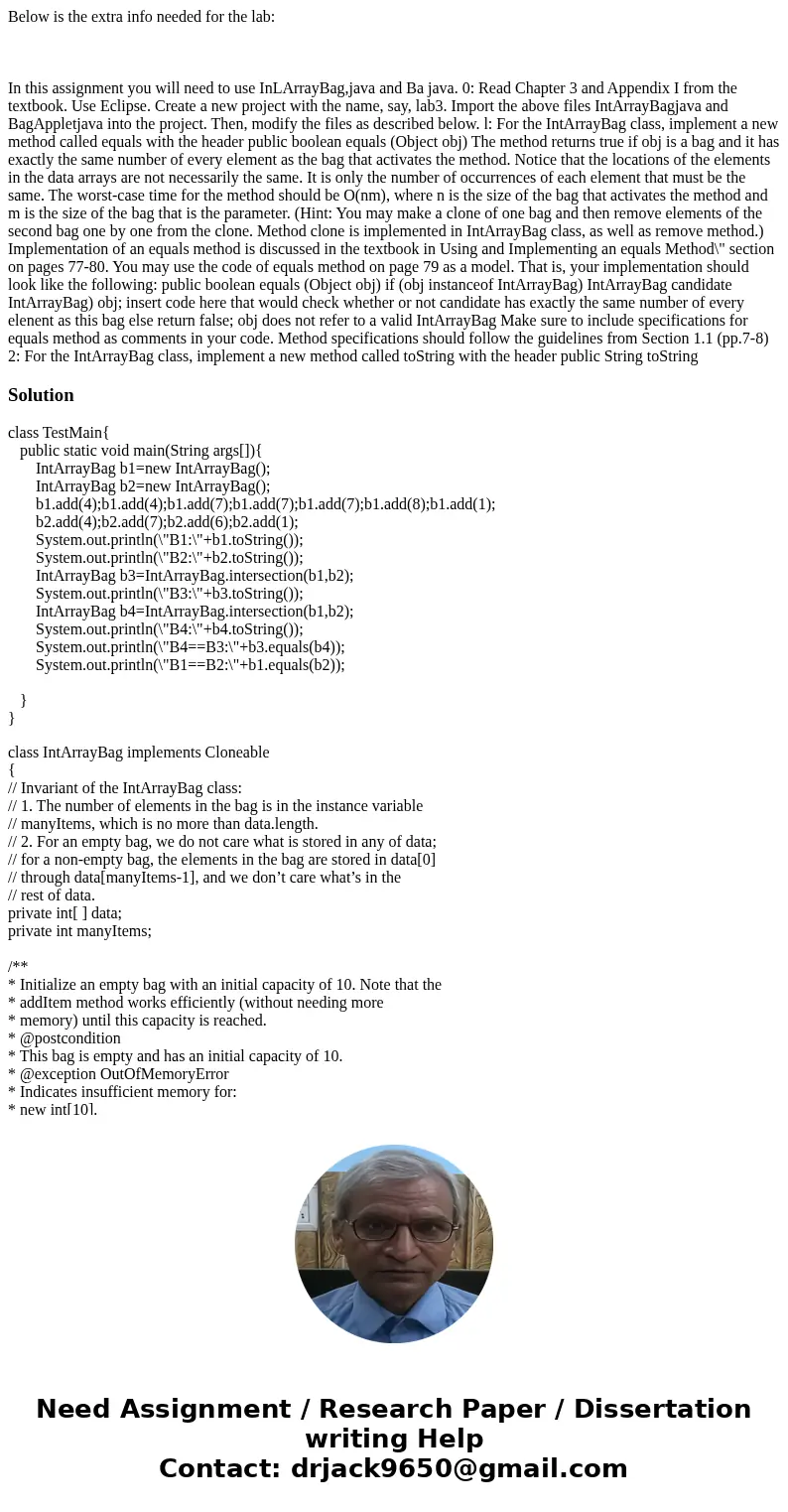
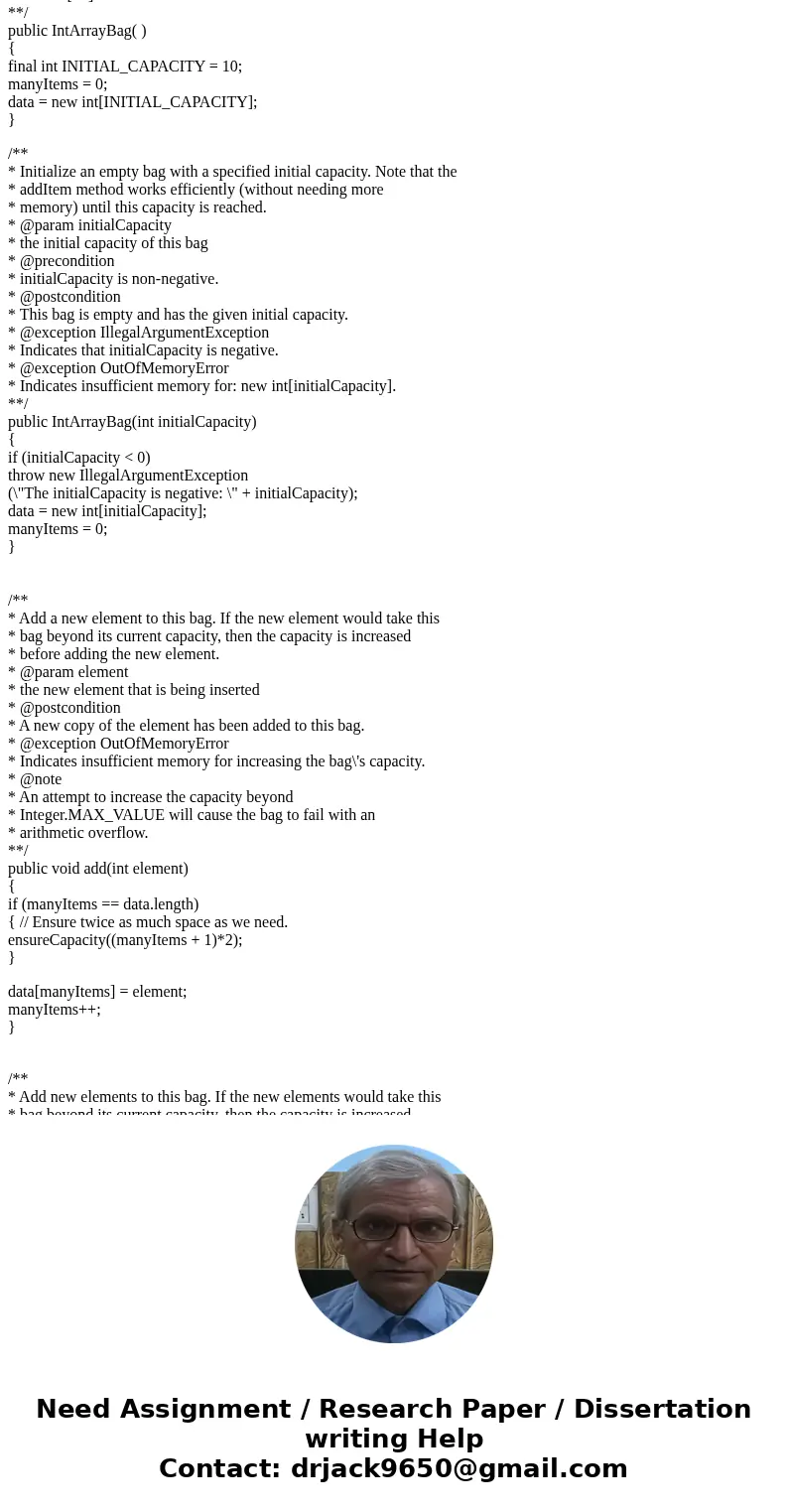
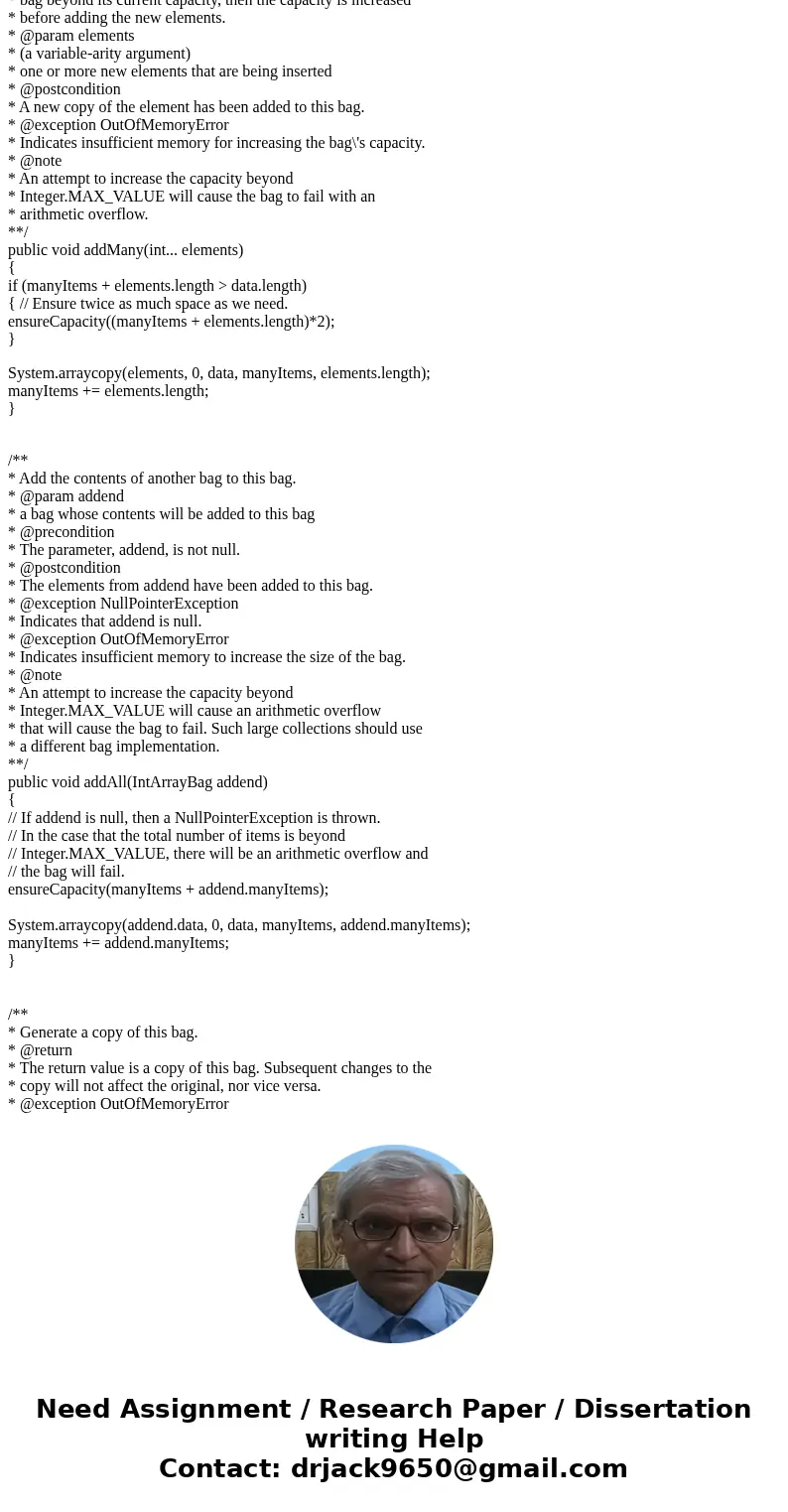
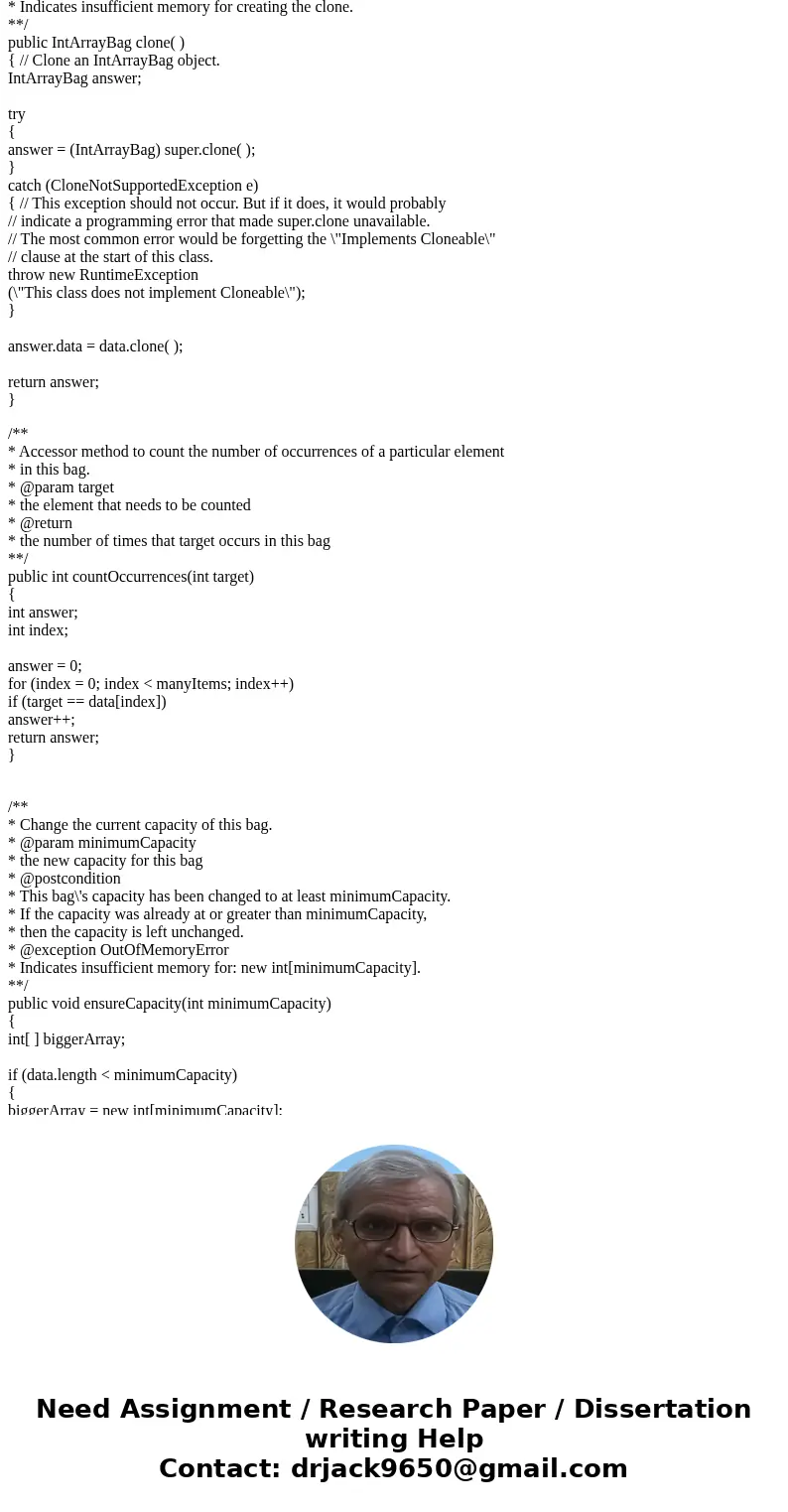
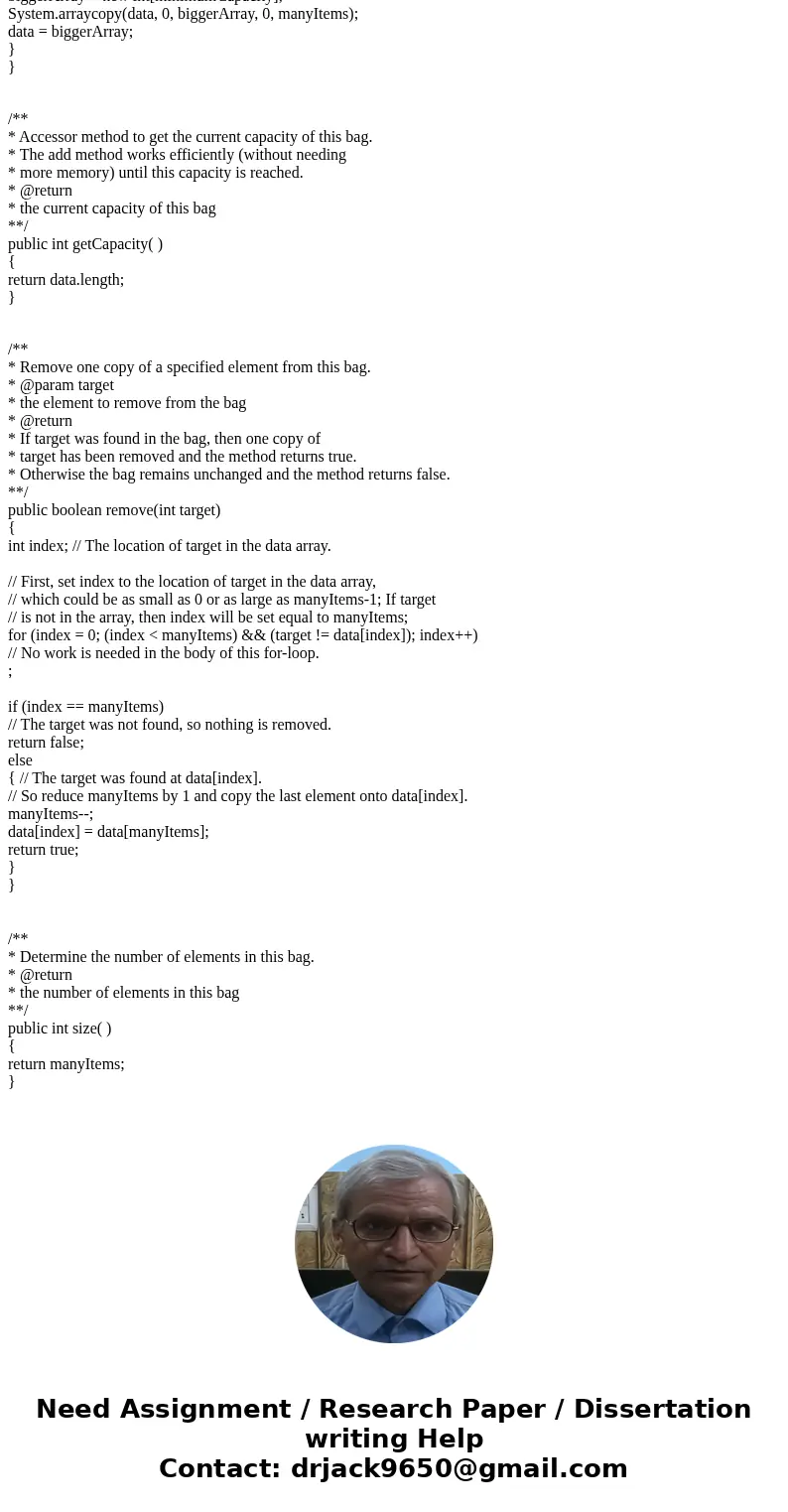
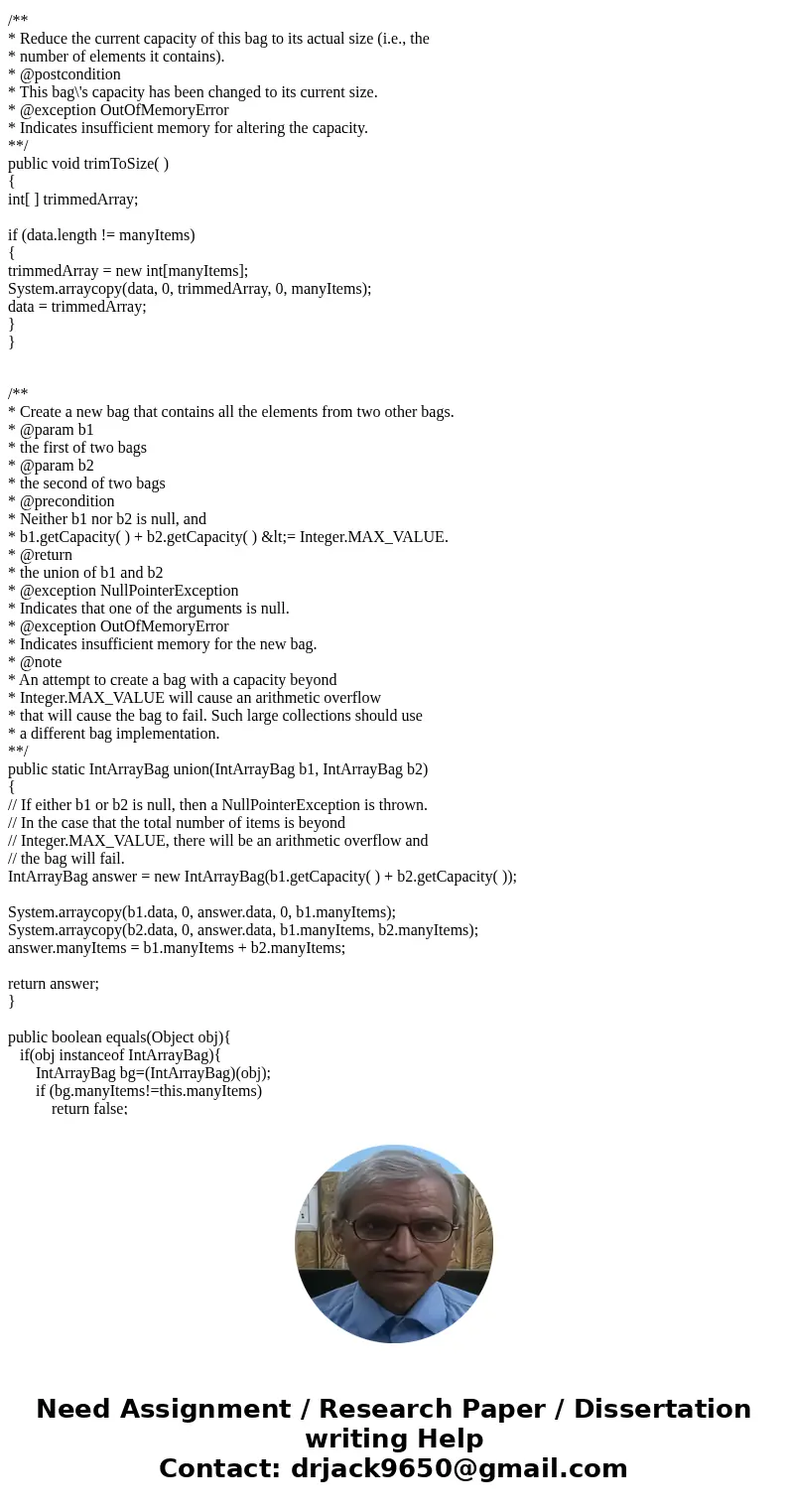
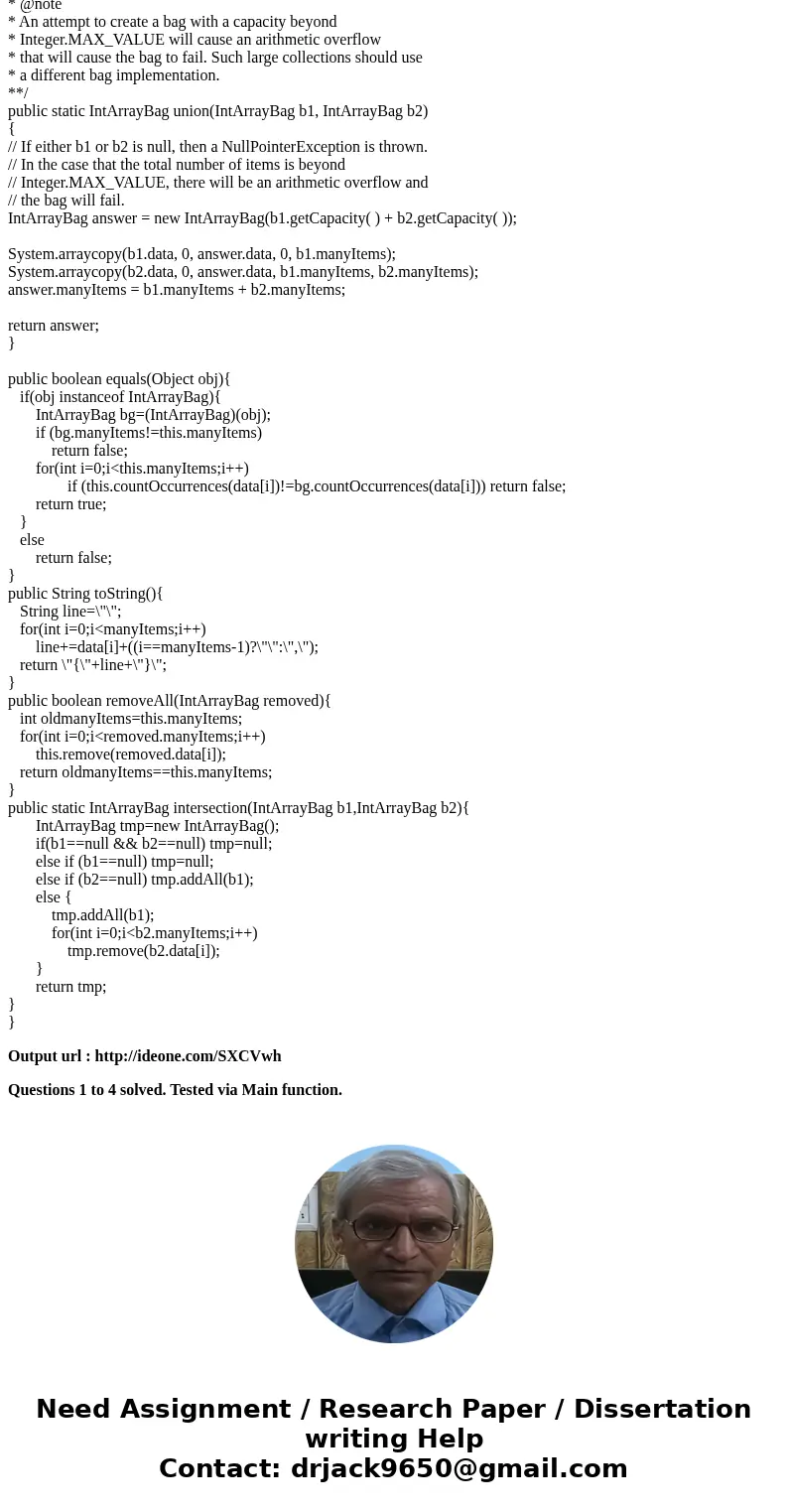
 Homework Sourse
Homework Sourse